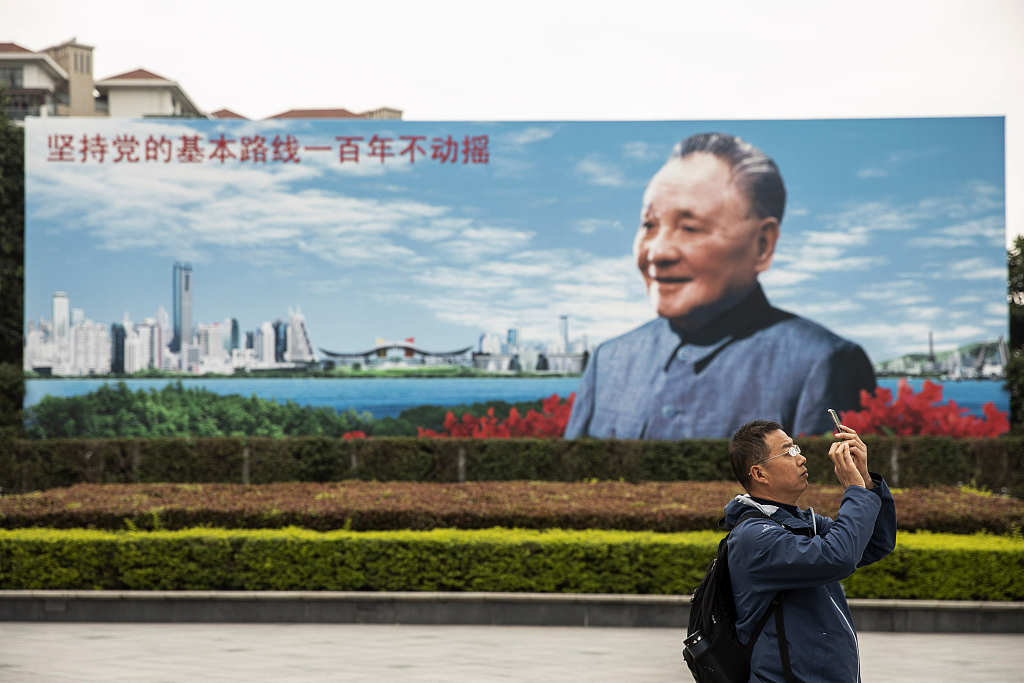CGTN:(高蕾)为什么国家治理对中国的进一步改革尤为重要
Why state governability matters for China's further reform
(来源:中央广播电视总台英语国际频道CGTN)

Editor's note: Gao Lei is an assistant professor from Collaboration Centre for Theories and Practice of Open Economy, Centre for Xi Jinping Thoughts on Open-up at the University of International Business & Economics; Xia Lu is an assistant professor from National Academy of Development & Strategy at the Renmin University of China. Dr. Gao is the main contributor, and Dr. Xia is the corresponding author. The article reflects the authors' opinions and not necessarily the views of CGTN.
The Central Committee of the Communist Party of China (CPC) has just concluded its fourth plenary session in Beijing. According to the official introduction of this meeting, the modernization of state governability and the improvement of the socialist system with Chinese characteristics are the main topics. These two themes are of considerable significance to China's further reform. In the communique released after the meeting, it again stresses that improving China's governing ability is a strategic mission of enormous significance.
As China is celebrating its 70th anniversary, it is appropriate to argue that state governability will definitely be the key contributing factor to the success of China both economically and socio-politically.
Economically speaking, the modernization of China's state governability is critical to the endurance and sustainability of China's current economic system, which combines the power of state and market. Conventional wisdom from Western scholars tends to tell a clear-cut distinctiveness between the state-led model with frequent government interventions, and the market-driven economy with a strictly constrained state role that highly relies upon private business to thrive.
In theory, they might have a point. Yet in practice, hardly can we find a dynamic economy energized purely and merely by the market mechanism. In fact, national economies in most OECD members have already become increasingly hybrid, i.e. state playing essential roles when the market fails.
Since it launched reform and opening-up four decades ago, China's economic development approach bears a strong similarity to the "developmental state model" discussed by Harvard professor Chalmers Johnson in his study on Japan's economic miracle in the 1960s.
But it is more than just a combination of state regulation and market force. During the four-decade reform period, the CPC has found a system that works for China. In just 40 years, China's GDP has grown by over a factor of 33.

Looking back, the "China experience" can be summarized as following: The top priority of state action is to promote rapid and dynamic economic development; the state is committed to building a smooth market mechanism and ensuring the protection of property rights; the state guides and regulates the market with macroeconomic policy instruments formulated by an elite economic bureaucracy; the state encourages cooperation and avoids tensions among governmental institutions, industries, and labor.
It cannot be emphasized enough that none of these could be fulfilled without a strong, effective, and efficient central authority, with which the further reform and development is indispensable.
Socio-politically speaking, the modernization of state governability is also critical to further integration and unification of China's polity and society. In the early reform period, scholars of Chinese political development pointed out that there was a paradoxical phenomenon: Strengthened local authorities and weakened central government. In other words, the increase of state presence in local society is not accompanied by the strengthening of political integration.
In many ways, this phenomenon resembles the process of political development characteristic in most parts of modern China. In fact, historians like Ray Huang, famous for his non-fiction best-seller 1587: A Year of No Significance, also discovered that "in ancient China, though the imperial administration was, in theory, omnipotent, in practice it was often unable to fulfill most goals."
With the history in mind, it is much clearer now why the CPC is making every effort to strengthen the state governing body while deepening the ongoing comprehensive reform in explicit emphasis on the Party's leadership. It is only through strong and effective leadership can China change the previous state where sound policies are a challenge for implementation by local governments.
President Xi Jinping made it very clear in early 2018 when the plan on deepening reform of Party and state institutions was released: Pushing for China's further reform is by no means weakening but strengthening the Party's leadership. At the core of the Party's plan is ensuring that its vast centralized state apparatus can keep up with increasingly rapid changes in society and economy domestically and internationally.
No one claims that leading such a vast country and managing its national economy and social affairs on such a gigantic scale is an easy job. Most of the Party cadres' governing and management capabilities do require updates and the Party's leadership at all levels needs to learn new skills such as how to become more effective, responsive, and accountable. In many ways, this is a "self-revolution" of the CPC to improve its leadership thus pushing a more successful China.
附原文链接:
https://news.cgtn.com/news/2019-10-31/Why-state-governability-matters-for-China-s-further-reform-Lf9MRBNO2k/index.html
未经允许不得转载:大学门户 » CGTN:(高蕾)为什么国家治理对中国的进一步改革尤为重要
相关推荐
- 70周年校庆活动预告(5月)
- 众志成城克时艰,爱心资助暖惠园 ——我校开展疫情防控专项资助
- 马克思主义学院“不忘初心、牢记使命”暑期实践团队赴中共琼崖一大旧址、“全国美丽乡村”仁里村开展调研
- 学史明理 缅怀先烈——教辅总支赴无名英雄纪念广场开展主题党日活动
- 校友活动∣瑞士校友会成立大会成功举行
- 我校三个基层党组织入选第二批全国党建工作标杆院系和样板支部培育创建单位
- 对外经济贸易大学召开党史学习教育动员大会
- 《21世纪经济报道》:(王志民)疫情拖累电子供应链 佳能相机即将全线涨价
- 《中国报道杂志社》:(桑百川)中国与东盟互为第一大贸易伙伴,关系如何更长久?
- 贸大团学队伍建设活动成功举办
- 战疫 | 清明祭:家国情结,惟忠惟孝
- 《中国劳动保障报》:(苏丽锋)外贸企业稳就业面临的困难及对策分析
- 俞利军教授被聘为司法部政府法制研究中心评审专家
- 金融学院本科生联合党支部举行“不忘初心、牢记使命”专题党课
- 对外经贸:构建扶贫三螺旋 打造扶贫价值链(上)
- 三八节致全校女教职工的慰问信
- 中国青年报、北京头条:中共党史党建研究中心在对外经济贸易大学成立
- 选择支教是迄今为止最不后悔的决定——我的支教故事⑨
- 我校举办第三届马克思主义与新时代中国对外开放新年论坛
- 《经济参考报》、《人民论坛网》等:(李明)财政政策要更加积极精准作为
新闻公告
- 党委中心组(扩大)专题学习全国“两会”精神 03-16
- 学校召开2022年第5次党委常委会 03-16
- 王敬波副校长出席出版社年度工作会议 03-16
- 《人民日报》:(张小锋)上好冬奥思政课(师说) 03-16
- 学校召开2022年第2次校长办公会 03-16
- 贸大近期科学研究进展(一) 03-15
- 我校成功举办“俄乌军事冲突前景及其影响研讨会” 03-15
- 我校组织新冠疫情日常防控及应急处置工作培训会 03-15
高考招生
- 对外经济贸易大学2017年招生章程 08-05
- 对外经济贸易大学招生章程(2018年) 08-05
- 对外经济贸易大学2015年招生章程 08-05
- 2016年对外经济贸易大学招生章程 08-05
- 对外经济贸易大学2014年本科招生章程 08-05
- 2014贸大远程秋季招生简章(学历) 08-05
- 对外经济贸易大学2012年招生章程 08-05
- 对外经济贸易大学2013年全日制普通本科招生章程 08-05
- 对外经济贸易大学2009年全日制普通本科招生章程 08-05
- 对外经济贸易大学2011年招生章程 08-05
